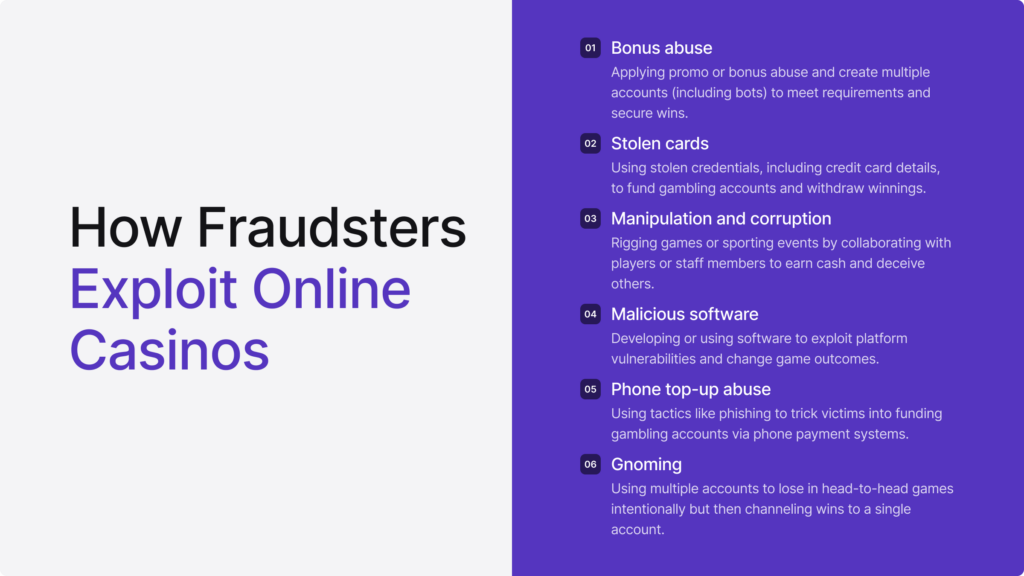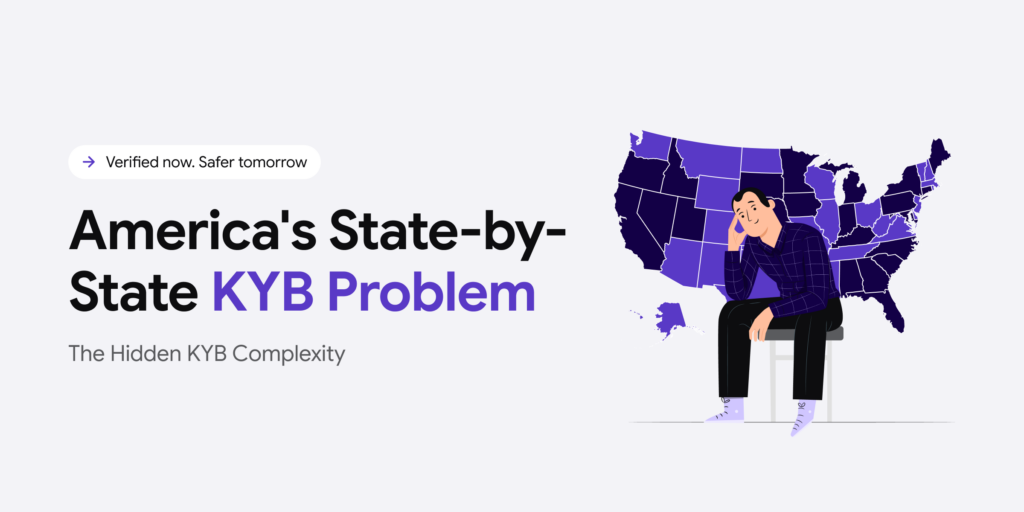Due to their somewhat attractive, addictive nature, gambling and gaming have been popular activities in various countries and cultures globally. Some play to win; some argue that casinos are a stupid way to lose cash. However, when the global pandemic hit, millions of users turned to online gambling, casino, and sports betting platforms to access that convenient alternative to dozens of entertainment options on the internet. To this day, this change has shifted how we see the iGaming industry, especially since gambling and casinos have become mainstream.
Statista projects that the gambling market will reach at least 977.3 million users by 2029. With such numbers, online casino scams have also become a hot topic on the radar. While we were used to inside jobs, chip dumping schemes, or the good old card-counting tactics, now we have more complex deceptive practices such as multiple accounts, bonus abuse, or the classic issue that casino and gaming establishments face, money laundering.
So, does the house always win, or have scammers actually found ways to outsmart casinos and walk away with big money? We’ll find out below.
How Does an Online Casino Scam Work?
A typical online casino scam is based on deceptive tactics where the individual aims to take advantage of the regulatory loopholes or the general casino system to gain a personal benefit of some sort, often financial gain. Due to the nature of online casinos and iGaming, it has a reputation of having legal grey areas and an attractive environment for cheating.
For example, a common casino scam is when a user creates multiple accounts, even though they are not allowed, uses stolen IDs to bypass Know Your Customer (KYC) checks, or employs spoofs to avoid getting detected using the same IP address on all their accounts.
Common online casino scam examples include:
- Abusing welcome bonuses by using bots or creating multiple accounts to access free spins and other similar advantages that help win.
- Using stolen credit cards to fund other already existing accounts or withdraw winnings from the online casino.
- Impersonating other users or using stolen details to create synthetic identities and fake accounts for unauthorized withdrawals.
- Rigging casino games by undermining fair play and manipulating the platform’s staff illegally.
- Using software and other technologies to exploit the casino’s vulnerabilities and access funds by manipulating the games’ outcomes.
Why does this happen? Simple. Online casino scams don’t require face-to-face interaction and are surrounded by the anonymity factor that comes with online gambling platforms and digital transactions. However, like with traditional gambling establishments, online casino scams result in financial loss for both the casino and its legitimate players, as they can be targeted as well.
Related: Top 5 Ways Fraudsters Commit Identity Theft
What are the Most Common Online Casino Scams in 2025?
Gambling revenue in the US alone reached $71.92 billion last year, up from $66.65 billion the year before. However, the bigger these numbers grow, the more bad actors want to leverage the industry’s success for their own benefit. Some of the new scams that have stormed the casino industry include generative AI fraud and deepfakes. Since online gambling is an age-restricted service offering casino games for legal adults, ID and age checks are mandatory for users.
That’s why fraudsters now use fake IDs and deepfake technology to bypass biometric verification, which consists of asking the user to upload their government-issued ID document (passport, driver’s license, etc.) and complete a quick selfie verification step before creating a new account on an online casino. Online gambling is age-restricted, requiring ID and age verification for all users. To bypass these checks, fraudsters now rely on fake IDs and deepfake technology to evade biometric verification.

Another issue that remains a huge headache for iGaming establishments is bonus abuse, a very common scam in the casino industry. Players looking to cheat the system exploit welcome bonuses by claiming free spins and other perks meant to attract new users, which is an industry standard that has become essential for staying competitive. For casinos and other iGaming establishments, bonus abuse results in revenue loss, with possible estimates reaching 10% of their annual gross revenue.
Related: Can You Combat Bonus Abuse in iGaming?
Five Online Casino Scams and Gambling Fraud Examples to Look Out For
To effectively detect and prevent casino scams, iGaming companies should be aware of the most common schemes. This also means implementing strategies to identify suspicious players and stop them from exploiting the system. Otherwise, gambling establishments risk losing customers and their money.
Here’s a more detailed breakdown of some popular fraudulent techniques that scammers use on various casino and gaming sites:
1. Value Betting
This is a strategy popular both in online casinos and sports betting platforms that uses “smart” bets with a higher chance of winning. The person using value betting focuses on the actual probability of an outcome and doesn’t bid blindly on offered odds. This is possible due to several factors, such as the likelihood of an event happening. For example, in poker, a value bet means that it was made with the goal to extract as much money (get paid by a worse hand) as possible from an opponent.
However, value betting carries risks, and like many similar strategies, it could lead to losing more money. Additionally, value betting itself is legal, but it depends on the situation. If the person uses this strategic approach to maximize their winning within the casino’s policy, they’re okay. However, if they use cheating mechanisms, such as poker bots, to amplify their winnings, this goes against the policy.
2. Player Collusion
This is a joint scheme where two or more players join forces to cheat the system and make it look like they are in different locations, even though they’re actually together. Player collusion involves location spoofing and aims to gain an advantage as a group over other players. It’s common in poker or any other regular online casino game, typically leaving other players with the idea that everyone is gambling fairly when in reality, they’re being cheated out of their winnings.
Player collusion is a real issue and a complex online casino scam because it can lead to:
- Serious offenses, including money laundering.
- Customer loss, as it’s a highly unethical and unfair practice.
- Other forms of fraud, such as proxy use, which often go hand in hand with collusion, making it harder to detect.

3. Gnoming
This is a form of multi-accounting, where the player creates multiple profiles on various casino sites to bypass standard requirements. For example, they use gnoming to access games after the online casino imposes a maximum bet limit. To actually succeed with this scheme, scammers use either stolen credentials or register under their relatives’ or friends’ names. Similar to other scams, the goal is to manipulate the outcome or exploit promotion benefits.
Gnoming becomes especially problematic when a single scammer controls multiple poker hands. By bypassing bet limits, they can place larger wagers on hands they know have a high chance of winning, giving them complete control of manipulating the game. Since all accounts appear to be legitimate by belonging to different individuals, online casino platforms struggle to detect this sort of scam, especially if no automated fraud prevention solutions are used (for example, for detecting the same IP address or suspicious changes on the player’s account).
4. Chip Dumping
This process is based on the tactic to lose the chips on purpose, giving them to another player at an online poker table. In a sense, chip dumping is similar to gnoming because multiple accounts are involved. If it was a fair play, money that was lost would go to another player. With chip dumping, since the scammer controls most of the accounts, they transfer the lost money to themselves, losing a hand to one of their own players.
For example, a fraudster might place large bets on a weak hand to lure legitimate players into raising their bets. Then, they follow up with a strong hand, but since other players perceive them as less aggressive, they hesitate to raise the stakes. While chip dumping is most common in poker, it can also be used in other types of online casino games.
5. Card-Not-Present (CNP) Fraud
CNP, or card-not-present fraud, happens when a person uses a fraudulent credit card transaction without physically holding the card. Since online casinos use digital transactions and don’t require physical cards, they are huge targets for scammers. In iGaming, this means the fraudster engaging in CNP fraud is gambling and playing casino games with somebody else’s card. So, in this sense, card-not-present fraud is also a form of both payment and identity fraud.
The consequences of CNP fraud for online casinos include cases where:
- The victims aren’t able to recover the stolen funds from their cards.
- There’s an increased chargeback rate, and the online casino is responsible for dealing with this issue.
That’s why many platforms now ask the user to enter the CVV number as a way to verify the cardholder’s possession.
How Do Scams Affect Online Casinos?
Like any sort of fraud, online casino scams and deceptive practices harm the reputation of iGaming platforms. This can result in various negative outcomes, such as adverse media or loss of active customers, who would rather spend their money on other gambling sites, especially after falling victim to a scam. This is common in multiplayer games like online poker, where the appeal of the gambling platform is very important. Frequent incidents can lead to even higher user drop-offs, slowing the company’s growth.
Other effects of online scams for casinos include:
- Increased chargebacks. Players dispute online gaming merchants as an attempt to not lose money or in cases when fraud happens and an unauthorized transaction in their name was made.
- Issues with payment processors. A very high chargeback rate can even result in the loss of a license. As a solution, some casino platforms restrict players’ deposit options, though this approach is not always well-received.
- Operational disruptions. Overly flooded customer support with complaints and requests can damage a casino platform’s internal operations in terms of inefficiency and high costs for management. In general, fraud prevention requires significant resources and automation solutions capable of handling large volumes of data.
- Non-compliance. Failing to detect casino scams and fraudulent transactions can lead to inconsistencies in the casino’s anti-money laundering (AML) program, resulting in legal issues and non-compliance fines.
Under the Bank Secrecy Act (BSA), all casino and iGaming establishments must comply with AML requirements, which are designed to prevent, detect, and, at the same time, help platforms report suspicious activities, such as if they suspect money laundering on their site. Global AML requirements vary, creating challenges for iGaming operators to stay compliant while effectively identifying casino scams and fraud. So, these legal gaps make the collaboration between operators and law enforcement more difficult due to inconsistency and jurisdiction-specific compliance requirements.
Related: AML Fraud — Types and Detection Measures
What Kind of Signs Show a Potential Scammer on an Online Casino Platform?
There are certain red flags that help iGaming platforms spot suspicious activity. These signs often reveal potential scammers who exploit online games — not to play fairly, but to make quick money and disappear with their winnings unnoticed.
Most common signs that signal that the player might be a scammer include:
- Device use. For example, the player repeatedly visits the platform using multiple devices but the same hardware or software combinations.
- IP address. For example, if the user accesses the online casino using a proxy, a VPN, a TOR browser, or another suspicious/blocklisted IP.
- Instant exit. For instance, if the user quickly wins and cashes out. This is common among scammers who use multi-accounting and withdraw winnings shortly after registering.
- Sign-up process. For example, if the player signs up and creates an account much faster than a typical new player (it’s a sign that they might have done it before).
- Playing patterns. For insurance, a bad actor intentionally chooses low-odd games that minimize the risk.
Related: Responsible Gaming — Does this Concept Actually Work?
Effective Steps to Prevent Gambling and Casino Fraud
The first and most important step for online casinos is to have a proper identity verification system. This is mandated by KYC regulations, which also require iGaming platforms to check their players’ age and implement age verification systems that are responsible for ethical gaming and ensuring the person is of legal age before they are allowed to access their gaming services. This also helps prevent scams like multiple account fraud and unauthorized charges resulting from identity theft and stolen payment details, for example, through CNP fraud.

To continue assessing user behavior after they already register an account on the casino and gaming site, companies like this need to use AML checks that are designed to detect suspicious transactions and atypical player behavior, such as unusual spending patterns or quick cash outs, which could be a sign of money laundering. This is a vital component of an online casino’s ongoing due diligence efforts applied throughout the player journey to fully protect their platform.
Solutions like AI-powered AML screening or streamlined customer risk assessment automatically calculate the user’s risk score, highlighting their risk factors and indicating whether additional manual checks are needed to determine if it’s a false positive. Additionally, there are other fraud prevention tools that track the user’s behavioral biometrics and any other red flags showing signs of suspicious behavior that deviate from the norm. Solutions like phone verification (assesses the risk linked to a phone number) or proxy detection (analyzes if a fraudulent proxy was used for scams on the platform) also instantly prevent scammers from being accepted into an iGaming platform.
For a more in-depth explanation, try iDenfy’s RegTech software, which is specifically designed to cater to high-risk industries like gambling and casinos, with cost-effective fraud prevention solutions.




